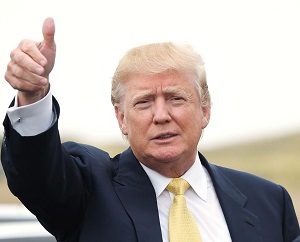Washington, Nov 9: US presidency under Donald Trump, a confessed big fan of India and Prime Minister Narendra Modi, is most likely to boost Indo-US strategic relationship with a special emphasis on defence ties and counter-terrorism cooperation.
Trump, 70, had recently described India as "a key, and key strategic ally" and looks forward to deepening the diplomatic and military cooperation that is the shared interest of both countries.
The billionaire businessman who has lauded economic policies of Modi had said he wants to work with him.
At an event in New Jersey less than a month from now, Trump had promised to the Indian-American community in him India would find a true friend at the White House.
"I am a big fan of Hindu and I am a big fan of India. If I am elected president, the Indian and Hindu community would have a true friend at the White House," he had said at an event organised by the Hindu Republican Coalition.
Trump said he appreciated "great friend India in the fight against radical Islamic terrorism."
India has experienced firsthand "brutality of terror" in the past "including the mayhem in Mumbai," he said and described the 2008 Mumbai terror attack and that on Indian Parliament in 2001 as "absolutely outrageous" and terrible.
"We will defeat radical Islamic terrorism. We will stand soldier-to-soldier in this fight. This is so important in the age of ISIS," he said.
"India's is the world's largest democracy and is a natural ally of the US. Under a Trump Administration, we are going to become even better friends. In fact, I will take the word even out because we are going to be best friends. I look forward to working with Prime Minister Modi, who has been very energetic in reforming the economy and bureaucracy. Great man. I applaud him," he said.
"I look forward to doing some serious bureaucratic trimming right here in the US, believe me we need it most," Trump said.
"Your great Prime Minister has been a pro-growth leader for India. He has simplified the tax code, cut the taxes and the economy is strong growing at 7 per cent year. Excellent," he said.
On the eve of the November 8 general elections, a key military advisor to the Trump said that India will have an important role to play in the Trump Administration's Asia Pacific policy of "peace through strength."
"This is a country that shares our values, this is a country that shares a lot of geo-political interest and I think, his (Trump's) work is going to be continuing the tradition of Bush Administration which made a lot of progress in that regard," Alexander Gray, a military advisor and author of several of the ambitious defence policies of Trump, said.
"We (a Trump Administration) would be looking to strengthen not just the cultural and economic aspect, but also on the defence side there is so much common ground with India. At a time when India's foreign policy is changing because of China and Pakistan, because of Islamic terrorism, we need to be there to greet them with open arms. I think, the Trump Administration is ready to do that," Gray said.





Comments
Add new comment